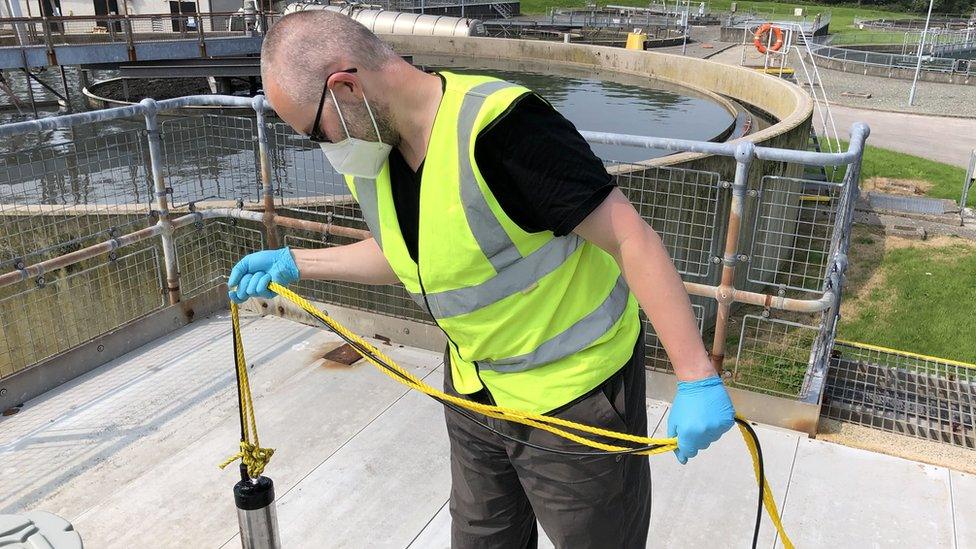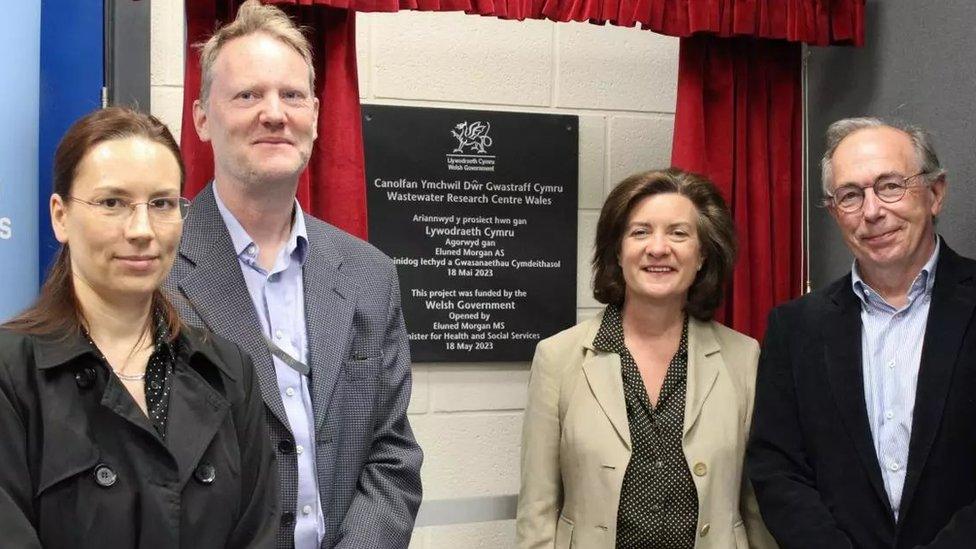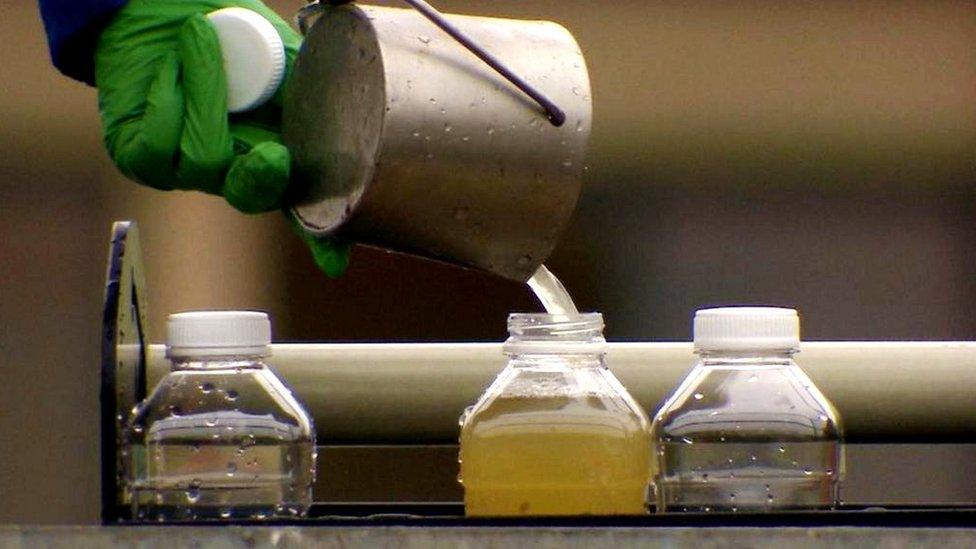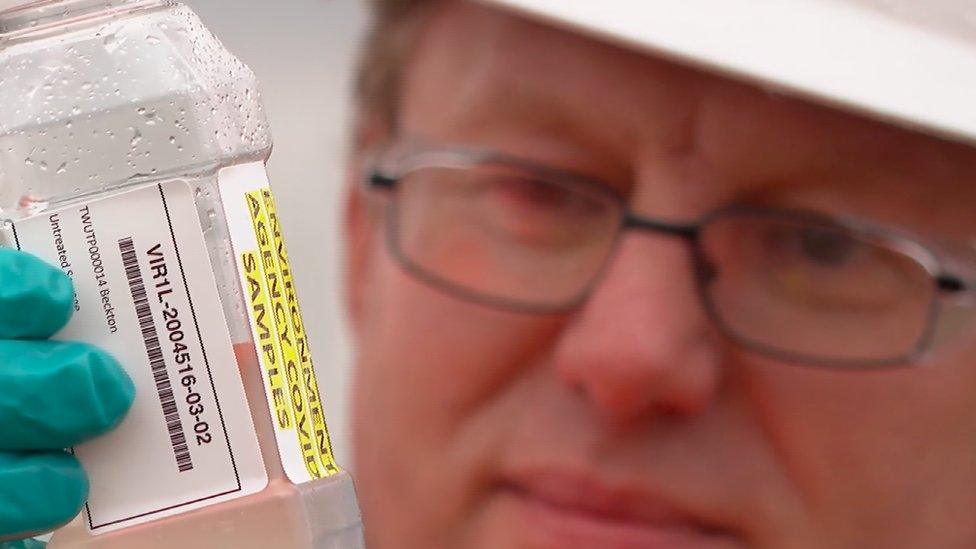Wales Covid sewage testing ends as £4m funding axed
- Published

Testing for Covid in sewage has been taking place in Wales since 2020
A Wales-wide scheme for monitoring sewage for Covid has been axed with about 20 jobs lost.
The National Wastewater Monitoring Programme had recently expanded, with a centre at Bangor officially opened by Health Minister Eluned Morgan a few months ago.
Bangor University said it was disappointed at the decision to end the project, which cost £4.4m a year.
But the Welsh government said it was facing difficult financial choices.
Waste water monitoring was one of the surveillance methods used during the pandemic to help track the prevalence of coronavirus.
Plaid Cymru's Mabon ap Gwynfor said it could not be "more important for the Welsh government to continue to support their work".
Work to monitor Welsh wastewater began in 2020 with Welsh government funding. The Bangor-led scheme, which included Cardiff University, Public Health Wales and Welsh Water, was expanded earlier this year from monitoring carried out at waste treatment plants to hospitals and other sites.
It also developed methods for testing for other viruses, including polio, norovirus and other stomach bugs and influenza.
Ms Morgan officially opened a Wastewater Research Centre at Bangor University in May. The Welsh government scrapped the funding two months later, on 24 July.

Health Minister Eluned Morgan officially opened the Wastewater Research Centre in May
A source close to the project said there was now no way to reliably measure Covid in Wales. "We now have no surveillance system in place," they said.
They said the scheme had worked out at 2p per person per week, and it was "super cost effective compared to conventional testing".
Bangor University said 18 people there would be made redundant from 31 August, with four others kept on until November to close the project.
In a statement the university said: "We are naturally very disappointed that our work on the national wastewater monitoring programme for Wales has been halted, but thank colleagues from the Welsh government and Public Health Wales for their past support.
"We are proud of the contribution made to the safeguarding of public health through monitoring of Covid-19, and the team remains convinced of the value of nationwide testing of wastewater as a mechanism for mapping public health and as an early warning system for countless communicable viruses and monitoring levels of antimicrobial resistance."
'We will need their expertise'
Mr ap Gwynfor said: "Should we ever find ourselves in the position again where a new disease is spreading across Wales, we will need their expertise in monitoring the spread of the disease, the emergence of new variants, and in helping prevent community outbreaks."
Wastewater monitoring for Covid in England ended in 2022.
Russell George, of the Welsh Conservatives, said: "I appreciate we have moved to a post-Covid time.
"However, it is odd that the Labour health minister only recently expanded the programme, just a few months ago, which shows a lack of forward planning and financial prudency by the Labour government."
A Welsh government spokesperson said: "Wastewater surveillance has provided us with enhanced data and information during the pandemic alongside our routine surveillance systems. We have supported the Wastewater Research Centre and we thank the teams for the support and work to develop the technology.
"We will continue to use the learning from the pandemic to aid our future planning, including the potential of wastewater surveillance.
"Our financial position after the UK spring budget in March was up to £900m lower in real terms than what we expected - and what the UK government said Wales needed - at the time of the last spending review in 2021.
"We are facing an extremely difficult financial situation this year - the toughest since devolution - and we must make some very difficult choices to ease the extraordinary pressures on the budget."

BINGE-WORTHY BOX SETS: Everyone is talking about these award-winning dramas...
WYNNE'S WELSH 70S: Nostalgia and footage from Wynne Evans' favourite decade

Related topics
- Published22 May 2021

- Published23 October 2020
